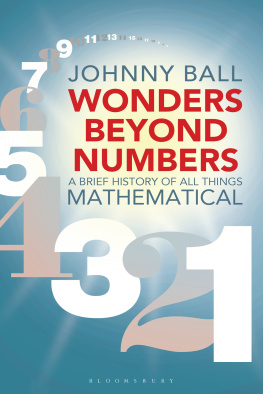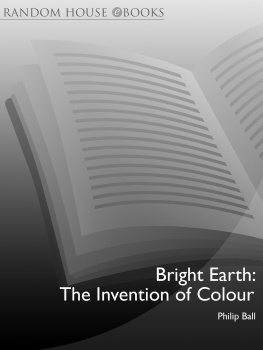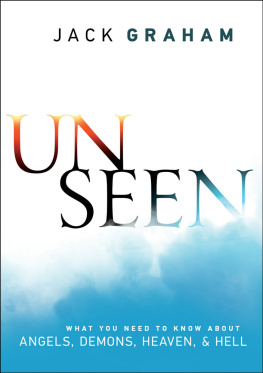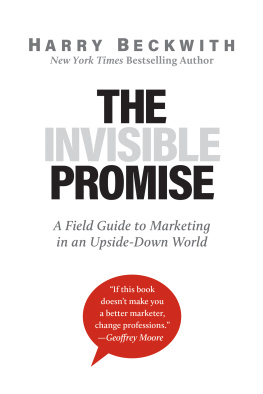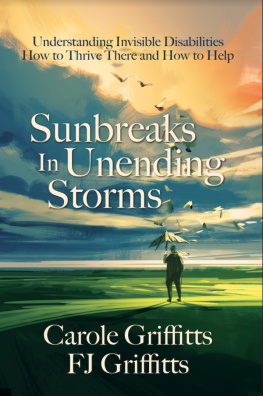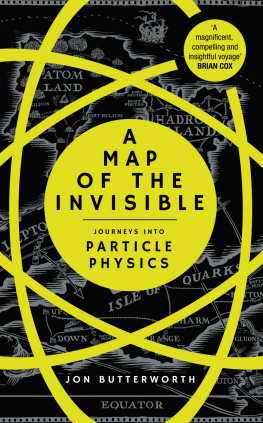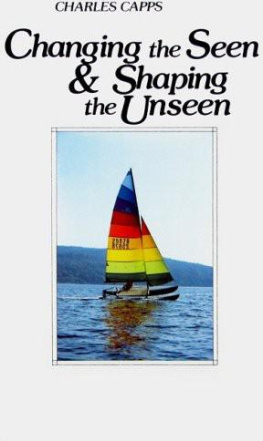Ball - Invisible : the dangerous allure of the unseen
Here you can read online Ball - Invisible : the dangerous allure of the unseen full text of the book (entire story) in english for free. Download pdf and epub, get meaning, cover and reviews about this ebook. year: 2016, genre: Religion. Description of the work, (preface) as well as reviews are available. Best literature library LitArk.com created for fans of good reading and offers a wide selection of genres:
Romance novel
Science fiction
Adventure
Detective
Science
History
Home and family
Prose
Art
Politics
Computer
Non-fiction
Religion
Business
Children
Humor
Choose a favorite category and find really read worthwhile books. Enjoy immersion in the world of imagination, feel the emotions of the characters or learn something new for yourself, make an fascinating discovery.

Invisible : the dangerous allure of the unseen: summary, description and annotation
We offer to read an annotation, description, summary or preface (depends on what the author of the book "Invisible : the dangerous allure of the unseen" wrote himself). If you haven't found the necessary information about the book — write in the comments, we will try to find it.
Ball: author's other books
Who wrote Invisible : the dangerous allure of the unseen? Find out the surname, the name of the author of the book and a list of all author's works by series.
Invisible : the dangerous allure of the unseen — read online for free the complete book (whole text) full work
Below is the text of the book, divided by pages. System saving the place of the last page read, allows you to conveniently read the book "Invisible : the dangerous allure of the unseen" online for free, without having to search again every time where you left off. Put a bookmark, and you can go to the page where you finished reading at any time.
Font size:
Interval:
Bookmark:
Invisible
The Dangerous Allure of the Unseen
Philip Ball
The University of Chicago Press
CHICAGO
PHILIP BALL is a freelance writer who lives in London. His many books include Curiosity: How Science Became Interested in Everything and Serving the Reich: The Struggle for the Soul of Physics under Hitler, both also published by the University of Chicago Press.
The University of Chicago Press, Chicago 60637 2015 by Philip Ball
All rights reserved. Published 2015.
Printed in the United States of America
24 23 22 21 20 19 18 17 16 15 1 2 3 4 5
ISBN-13: 978-0-226-23889-0 (cloth)
ISBN-13: 978-0-226-23892-0 (e-book)
DOI: 10.7208/chicago/9780226238920.001.0001
Originally published by Bodley Head, 2013.
LIBRARY OF CONGRESS CATALOGING-IN-PUBLICATION DATA
Ball, Philip, 1962 author.
Invisible : the dangerous allure of the unseen / Philip Ball.
pages : illustrations ; cm
Includes bibliographical references and index.
ISBN 978-0-226-23889-0 (cloth : alk. paper) ISBN 978-0-226-23892-0 (e-book)
1. Invisibility. I. Title.
QC406.B35 2015
535.1dc23
2014035709
 This paper meets the requirements of ANSI/NISO Z39.48-1992 (Permanence of Paper).
This paper meets the requirements of ANSI/NISO Z39.48-1992 (Permanence of Paper).
Contents
Illustrations
.
.
.
.
.
.
.
.
.
.
.
.
.
.
.
.
.
.
.
.
.
.
.
.
.
.
.
.
.
.
.
.
.
.
.
), taken by Philippe Crassous.
.
.
.
.
.
.
.
.
.
.
.
.
.
.
.
.
.
.
.
.
.
.
.
.
.
.
.
.
.
.
.
.
.
.
Preface
I had hoped to find occasion somewhere in this book to mention the delightful little book by Yoshi Oida called The Invisible Actor. I never did. That is because, I now realise, it belongs here in the preliminaries, where the author stands on the stage in person and prepares to disappear. Like the actor, he or she must subsequently become invisible, and what remains is a performance.
Oida has many thoughtful things to say about performance. There are lessons in his book for the writer but I dont think I have yet fully understood them, much less mastered them. In the Kabuki theatre, he says,
there is a gesture which indicates looking at the moon, where the actor points into the sky with his index finger. One actor, who was very talented, performed this gesture with grace and elegance. The audience thought: Oh, his movement is so beautiful! They enjoyed the beauty of his performance, and the technical mastery he displayed.
Another actor made the same gesture, pointing at the moon. The audience didnt notice whether or not he moved elegantly; they simply saw the moon. I prefer this kind of actor: the one who shows the moon to the audience. The actor who can become invisible.
This applies to fiction writers: there are those we admire for their style, and there are those we admire because they vanish so that all we see is the story. The former may be consummate performers, but the latter are magicians. And we might wonder, as many novelists wonder of, say, Penelope Fitzgerald, how did they do that?
How does this notion translate to non-fiction? All I can say for sure is that the performative aspect remains, and that what Oida says of performance remains true also: Your job as an actor is not to display how well you perform, but rather through your performance to enable the stage to come alive.
What is also true, however, is that the performer doesnt achieve any of this unaided. There are directors, technicians and engineers, back-of-house staff. Theres no show without them. I am fortunate indeed to have such a dependable and experienced crew: my agent Clare Alexander and my editors and copy-editor at Bodley Head, Katherine Ailes, Jrg Hensgen and Kay Peddle. I have also benefitted from a generous and deeply knowledgeable team of advisers: for their thoughtful comments, corrections and general conversation I am grateful to Ruth Bottigheimer, William Brock, Huanyang Chen, Owen Davies, Claire Hardaker, Ulf Leonhardt, Richard Noakes, John Pendry, Roberto Piazza, Christopher Priest, Hollis Robbins, James Russell, David Smith and Francisco Vaz da Silva. And for posing an innocent question that set the whole performance in train, I owe a great debt to Anais Tondeur. My family dont need to see the performance, because they have to live every day with the rehearsals. They are the reason I get through them.
Philip Ball
London, May 2014
Why We Disappear
was a magic ring: it made you invisible! He had heard of such things, of course, in old tales; but it was hard to believe that he really had found one, by accident.
J. R. R. Tolkien
The Hobbit (1937)
; perhaps all the wisdom, and all truth, and all sincerity, are just compressed into that inappreciable moment of time in which we step over the threshold of the invisible.
Joseph Conrad
Heart of Darkness (1899)
In old tales and usually in our new ones too no one becomes invisible without a motive. Its the peculiarity of our times that we focus on the means and not the motive. Scientists and technologists today are slowly finding out how to build what they like to call invisibility cloaks and the world watches, for the most part entertained and amazed. But in the old stories, in myths and legends and fairy tales, invisibility was never so laboriously achieved, nor so compromised in the achievement. Making something invisible demanded special knowledge or special favours, but once that ability was secured, the magic simply happened. No one was particularly surprised or impressed by the feat itself; what mattered was not how but why you did it.
What is so easily forgotten when legend and fable are enlisted as a charming bit of scene-setting for announcements of technological advance is that these stories are not engineering challenges set by our ancestors. They might be filled with gods and devils, imps and giants, but they are really about our own world and the things we do to one another. Its in this sense that we have always possessed the secret of invisibility, and have always known where it might lead. We know what powers it conveys, and what dangers.
These are the subjects of my book, and this is why more than for any banal chronological purposes it must start at the beginning. For in the history of invisibility, the punchline comes at the outset: it is the earliest manifestations that tell us, in some respects, all we need to know about invisibility. The rest is just the engineering. But it is the engineering the how can we do this that discloses most eloquently the complications and repercussions that appear when myth collides with reality. In the gap between what we hoped for and what we got is a glimpse of who we are.
The magic ring
If you could be invisible, what would you do? The chances are that it will have something to do with power, wealth or sex. Perhaps all three, given the opportunity.
If thats so, there is no need to feel guilty. Or rather, it is doubtless good for the soul to experience a little contrition, but your response is not perverse or aberrant. We have it on Platos authority that this is all perfectly normal. In the Republic he (or rather, his narrator Glaucon) explains that invisibility is not a technical problem but a moral one.
There are several accounts of how Gyges, the ancestor of King Croesus of Lydia, rose from humble origins to found the third dynasty of Lydian kings in the first millennium BC. All of them present him as a usurper and several say he was driven by lust both carnal and political. Gyges, it is generally agreed, stole from Candaules of Lydia both his throne and his wife. According to Herodotus, the old king brought it upon himself by ordering Gyges, who was his bodyguard at the time, to look secretly upon his queen so that he might be compelled to admit her outstanding beauty.but the queen discovered him in his hiding place and, enraged by her husbands shameful behaviour, gave Gyges the option of killing the king or being put to death himself. He could hardly be blamed for the choice he made.
Next pageFont size:
Interval:
Bookmark:
Similar books «Invisible : the dangerous allure of the unseen»
Look at similar books to Invisible : the dangerous allure of the unseen. We have selected literature similar in name and meaning in the hope of providing readers with more options to find new, interesting, not yet read works.
Discussion, reviews of the book Invisible : the dangerous allure of the unseen and just readers' own opinions. Leave your comments, write what you think about the work, its meaning or the main characters. Specify what exactly you liked and what you didn't like, and why you think so.


